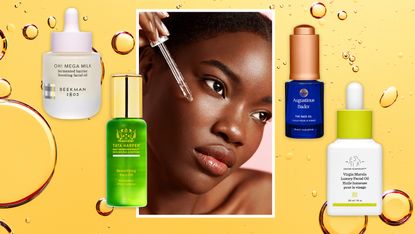
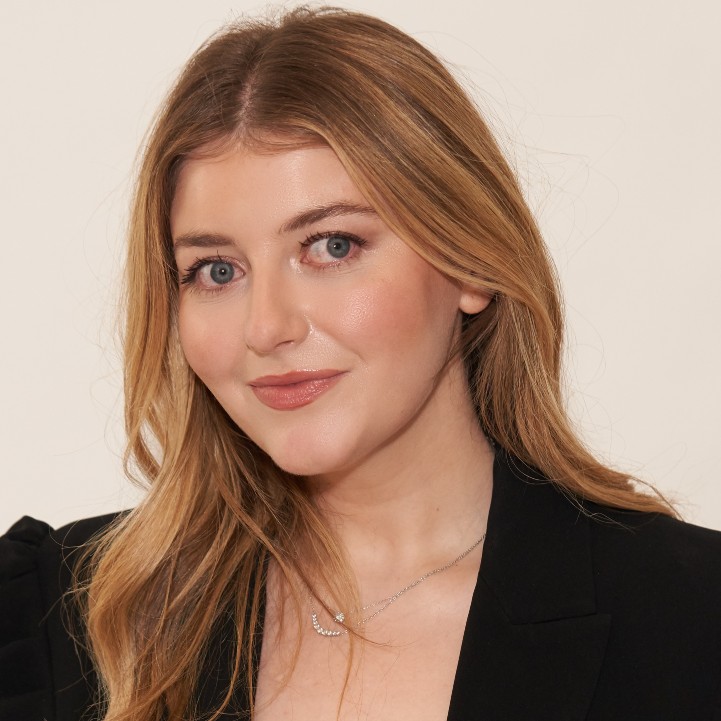
Face oils get a bad rap—and they shouldn’t. I get it: The word “oil” can throw you off. Your mind goes straight to greasy, slick, suffocating, and sticky. In reality? The best face oils are anything but. They actually have the power to treat your skin issues (looking at you, acne), work for all skin types (they’re derm-approved), and are masters of hydration. You’ll have to pick the right player (read: jojoba oil, marula oil, moringa oil—the list goes on) to get results, but once that’s said and done you’re gearing up for a lifetime of healthy, hydrated, and glowy skin.
"Facial oils can provide benefits to the skin by acting as occlusives (which act like sealants in order to keep water in the skin) and emollients (which soften and strengthen the outer layer of the skin by filling in spaces between skin cells)," explains along with board-certified dermatologist Dr. Melissa Kanchanapoomi Levin. "Skincare oils often form a protective barrier on the outer layer of the skin rather than hydrating the skin. The benefits of skincare oils is that certain oils can provide antioxidative, anti-inflammatory, and skin barrier repair properties."
I know, you might still be questioning my oil-loving antics. But don’t knock it till you try it. To win you over, I, and some of the Marie Claire team, are sharing the best face oils in existence. Here, you’ll find the very top products for your oily, sensitive, dry, broken-out, and yes, even normal skin. So toss your excuses to the side and give one of the best face oils a go.
What to Look For in Face Oil
- Type of Oil
There is a wide range of oils to choose from—and the best one for you is closely related to your specific skin type and concern. "For example, for sun-damaged skin, rosehip oil is one of my favorite oils since it has a high ratio of linoleic acid, which has not only been shown to be beneficial for those with acne, but also has been shown to reverse UV-induced hyperpigmentation," explains Dr. Levin.
Oily skin and acne-prone skin, on the other hand, is best off with jojoba oil. "It's structure mimics your own skin's natural sebum which is appropriate for oily and acne-prone skin while providing moisturization. Tea tree oil is also a great option as a facial oil alternative to acne-fighting ingredients such as salicylic acid and benzoyl peroxide." There is a rare chance of allergic contact dermatitis with tea tree oil so if you develop a rash, it’s important to see a board-certified dermatologist.
- Treatment
At a baseline, a facial oil is going to offer hydration. But more often than not, these products are packed with additional ingredients that provide supplementary benefits. "Since some facial oils are antioxidants and have vitamins like vitamin C and E, they neutralize free radicals to slow the aging process," says Dr. Levin. "Certain facial oils have hydration properties and can be used as a moisturizer to help restore the natural oils in the skin and hair, improve skin hydration, and restore and strengthen the skin’s natural protective barrier."
- Fragrance
If you're not sensitive, then by all means go straight for the deliciously smelling products. If you are sensitive? Steer clear. "Fragrant plant-based oils or essential oils can cause skin irritation, photosensitivity, and even cause allergic reactions. For those with known plant-based allergies or sensitive skin in general, I recommend avoiding fragrant essential oils and to test every oil in their forearm for at least a week before applying on the face to test whether a reaction will occur," says Dr. Levin.
Stay In The Know
Marie Claire email subscribers get intel on fashion and beauty trends, hot-off-the-press celebrity news, and more. Sign up here.
The Best Face Oils for Every Skin Type
- The Best Face Oil Overall: Drunk Elephant Marula Oil
- The Best Face Oil for Dry Skin: Tata Harper Beautifying Face Oil
- The Best Face Oil for Combination Skin: True Botanicals Renew Pure Radiance Oil
- The Best Face Oil for Environmental Protection: Furtuna Skin Due Alberi Biphase Moisturizing Oil
- The Best Affordable Face Oil: The Ordinary 100% Organic Cold Pressed Rosehip Seed Oil
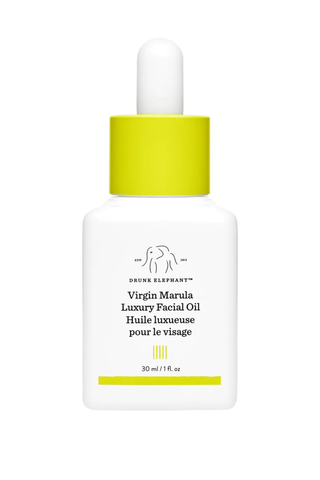
I credit this oil with curing my out-of-whack, ultra-sensitive skin a few years back. The formula is extremely rich in fatty acids, which helps keep the moisture barrier in a healthy state. In my particular experience, it regulated my oil production so my skin looked glowy and no longer greasy. Perhaps the best part about this oil though is the unmatched glow. I like to go heavy on the oil in the evenings and use just a few drops in my foundation in the morning for an extra bit of shine.
Pros: Fragrance-free; Good for sensitive skin; Editor-approved
Cons: Some say it sits on the skin
Customer Review: "I love this oil it leaves a nice glow on my skin. It doesn’t leave your skin looking greasy. And it is super hydrating on my skin. I absolutely love this product." — Sephora
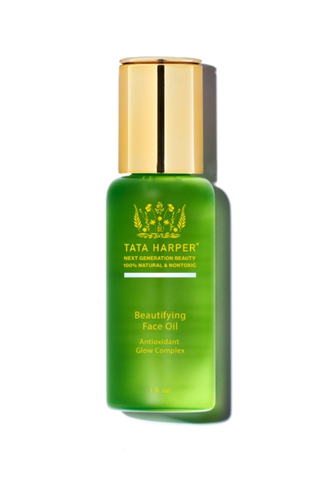
When your skin is extra dry, having a good glow seems out of the question. Any sign of radiance has been nullified by dead skin cells and an overarching dull appearance. But trust me when I say that this face oil will reboot your skin in just a few uses. The hydrating formula, which is fortified with antioxidants and vitamins (including vitamin C!), will quench your skin and give you a sheer shine in no time. Pro tip: You can also use this on your cuticles or even as a hair oil.
Pros: Good for dry skin; Lightweight; Gives glow
Cons: Expensive
Customer Review: "I really love this product. Makes my skin look smooth and glows. I use at night with my moistorizer and in the day also. The smell is great and doesn't leave me feeling sticky or anything. Ill be buying again and again." — Tata Harper
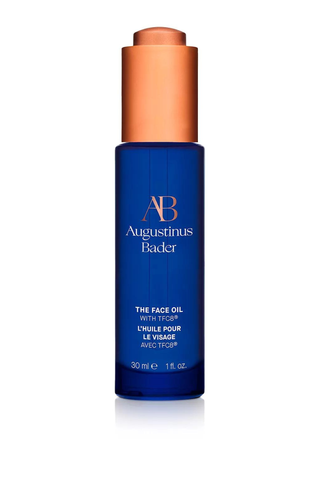
If you’re a fan of the brand’s Face Cream, Face Cream Rich, or even the Essence, I promise you’ll fall in love with the luxe Face Oil. It contains a specially formulated blend of amino acid-rich oils (think: argan oil, hazelnut oil, babassu oil, and more) that are designed to trap moisture in the skin. The result? Increased hydration, a healthier barrier, and stronger skin. Of course, it also includes the brand’s proprietary TFC8 complex, which is packed with vitamins and nutrients that promote renewal.
Pros: Doesn’t feel greasy or oily
Cons: Might pill with certain products
Customer Review: "I really love this product. It makes my skin look smooth and glow. I use at night with my moisturizer. The smell is great and doesn't leave me feeling sticky. I'll be buying this again and again." — Nordstrom
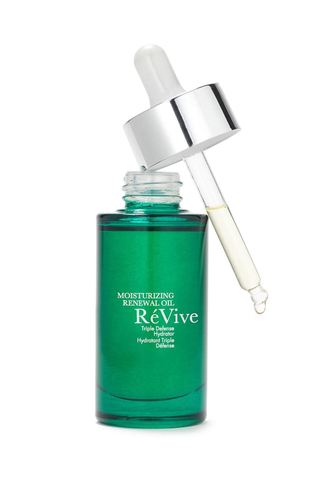
I never thought I would be able to forgo a moisturizer—my skin gets pretty dry. But this deeply hydrating face oil completely changed my outlook. It’s powered by the brand’s signature Bio Renewal Peptide, along with a complex of rosehip seed oil, sweet almond, and evening primrose, all of which have nourishing, moisturizing properties. I’m able to apply this as the final step in my routine—sans moisturizer—and remain glowy and hydrated all day. It doesn’t just focus on hydration though; the oil is also fortified with antioxidants and vitamins to protect against environmental aggressors.
Pros: Deeply hydrating; Provides environmental protection
Cons: Might be too heavy for some
Customer Review: "Just a small drop of this oil leaves my skin more luminous and it feels soft and moisturized. It’s great under the day cream and foundation and also at night under the night cream." — Bloomingdales
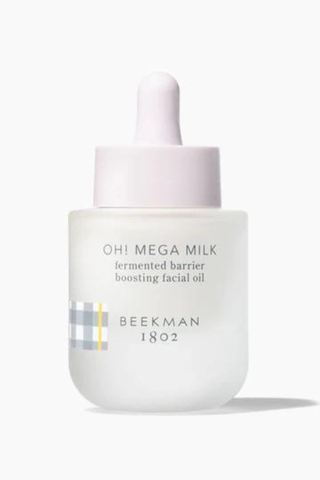
Hate the feel of face oil? I get it—they can be greasy, sticky, and, well, oily. If texture is your main objection, I challenge you to try this face oil from Beekman. It absorbs at the speed of light, has a texture reminiscent of a milky serum, and won’t leave a tacky texture on your face. Instead, the formula’s great ingredients like niacinamide and vitamin C are going to sink into the skin to provide softness and an even tone. It’s also worth noting that this does not contain any mineral oils, which makes it an ideal option for sensitive or acne-prone skin types.
Pros: Great texture; No mineral oil
Cons: Has a slight smell
Customer Review: "I've been using this product twice daily for most of this year, and it's The BEST skin, hydrating product I've had in a long time; moisturizing and KIND to the skin and eye area, while minimizing fine lines. " — Ulta
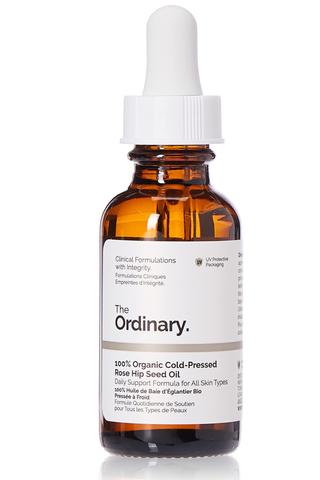
A great face oil doesn't have to break the bank. Take this option from The Ordinary for example. It costs just $11 and gets the job done thanks to its rosehip seed oil formulation. It’s simple and fuss-free, but the natural-origin oil is highly effective at hydrating the skin and reducing signs of photoaging. It does have a scent, but just take it as a sign that it’s potent and working.
Pros: Affordable; Hydrating
Cons: Takes a bit of time to dry
Customer Review: "I use a drop of this below each eye after cleansing and before applying night cream. I definitely notice a difference in the morning when I do this. I also sometimes add a drop to my moisturizer in winter when I need a little extra hydration." — Ulta
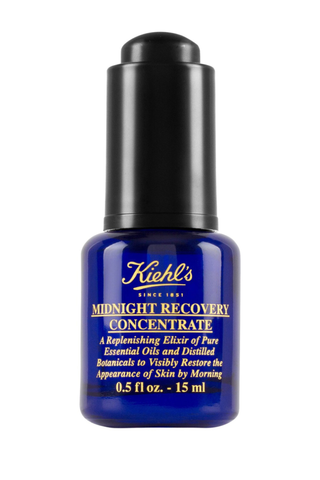
You could say this face oil is somewhat of a cult-favorite—it has nearly 1,000 five-star reviews on Sephora. It does all the normal face oil things (think: hydration, radiance), but it also has the ability to smooth out uneven texture, firm, and soothe an irritated complexion thanks to ingredients like lavender oil and squalane. A little does go a long way, so use just three to four drops to start.
Pros: Great reviews; Firming abilities
Cons: Slightly fragrant
Customer Review: "I can’t live without this product. I genuinely feel like this is keeping my skin from aging. My skin looks and feels so healthy. After I wash my face, I put some retinol on and then this, and then my moisturizer. It’s made a pretty noticeable difference since I added it." — Sephora
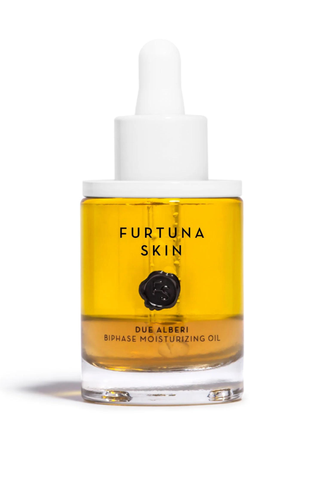
Some face oils run on the heavier side and should be reserved for nightly use. This one? Lather it in on during the a.m.—it’s packed with loads of ingredients designed to protect your skin from environmental aggressors like pollution, blue light, and free radicals. I’ll spare you the nitty-gritty ingredient details, but you should know this contains a high concentration of vitamin C, along with magnolia oil, which is responsible for giving your skin a plumped-up appearance.
Pros: Protects against the environment; Not greasy
Cons: Herbaceous fragrance
Customer Review: "LOVE this beautiful oil! It is the first facial oil I have ever used that does not have an oily smell. It is light weight with a pleasant aroma and absorbs right away. I also appreciate all the wonderful organic ingredients included in this formula." — Bluemercury
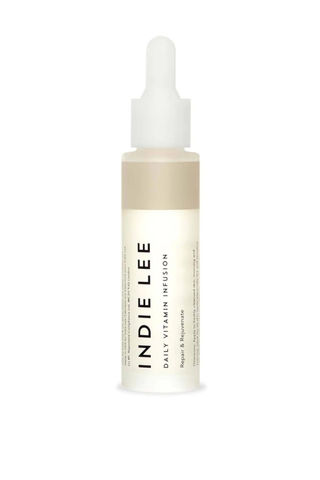
Face oils offer hydration—yes. But, they can also be very effective at treating specific skin concerns, ranging from hyperpigmentation to large pores. Case in point? Indie Lee’s Daily Vitamin Infusion Face Oil is designed to even out discoloration thanks to a high concentration of vitamin C, vitamin A, and vitamin E. It’s also incredibly soothing for stressed-out skin courtesy of a high concentration of ceramides, along with squalane and rosemary leaf.
Pros: Affordable; Treatment
Cons: Not ideal for acne-prone skin (contains coconut oil)
Customer Review: "I have combination, acne prone skin, and this oil works so well for me! It feels amazing going on and is gentle so fits easily into my current routine. It instantly leaves my skin glowy, radiant, and moisturized! A perfect, intensly nourishing daily oil to maintain healthy, happy skin!" — Nordstrom
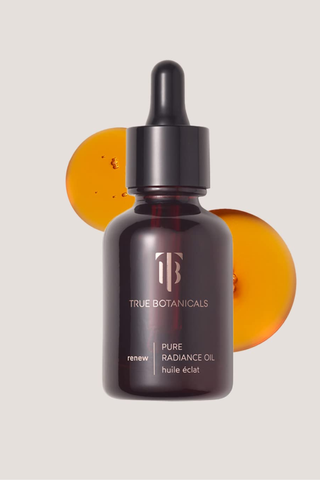
Calling all combination skin types! Don’t be scared of oil; it might be the missing piece to your skincare routine. This particular option from True Botanicals can take the place of your moisturizer and provide thorough albeit lightweight hydration that will keep your temperamental skin in check. As an added benefit, it also has plumping and smoothing abilities that will decrease the look of fine lines and wrinkles in mature skin types. From a scent perspective, you can expect a mix of neroli and jasmine.
Pros: Treatment; Dry oil
Cons: Fragrant
Customer Review: After only a week of using the Renew Radiance Oil, I am hooked! My skin is so hydrated! My skin tone is already evening out so much and my blackheads are all but gone. Have a healthy glow to my skin. Very very happy with this product!" — Nordstrom
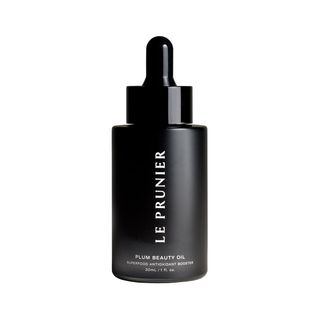
Antioxidants take center stage with this rich face oil. Not only are you going to reap the free radical repelling benefits, but your skin will also get extra dose of hydration and strength. An added bonus? A UV protection booster made its way into the formula, so your SPF will work harder. From a texture standpoint, this oil feels luxe as can be, while maintaining a weightless texture.
Pros: Filled with great ingredients; No essential oils and sensitive skin safe
Cons: Fragrant
Customer Review: "I am not someone with a very complex skincare routine but after I oil cleanse I am obsessed with using this oil day and night. I feel like it has tightened my finer lines. I get asked if I do Botox and I do not (and will not). And despite some review I love the smell, it smells like marzipan!" — Detox Market
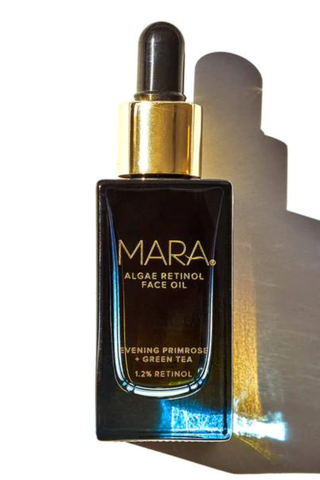
“It's not cheap, but I love this do-it-all face oil. Let me count the ways: Number one, it has retinol—and not just a little, either, but a whopping 1.2% (that's a lot of retinol, so go easy if your skin isn't used to higher concentrations). Number two: When it's not promoting skin turnover with its concentrated retinol, it's soothing with algae and green tea. Number three: It's clean, vegan, and cruelty-free. (Get the non-retinol version if you have sensitive skin.)” — Jenny Hollander, Content Strategy Director
Pros: Contain retinol; Calming
Cons: Scented
Customer Review: My skin has absolutely loved this algae retinol oil. I’m new to retinol so I thought incorporating an alternative oil would be easy enough and good enough to actually make a difference on my skin and I was right. So far I love the way my skin looks. I can see a huge difference in the hydration level and plumpness of my face which I love because I know that overtime that will help with the wrinkles." — Sephora
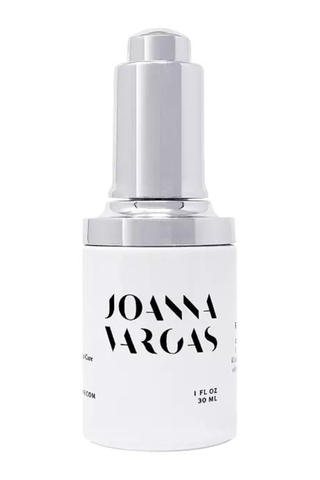
“Joanna Vargas' Rescue Serum is an oil-based formula that replenishes the skin yet somehow applies with a smooth finish, so on a makeup-free day, you can apply it to a freshly cleansed face anytime and not worry about looking too oily. (But of course, it's best to apply at night, after cleansing and before your night cream). Made with vitamin C, squalane and antioxidants, this powerful mix boosts radiance, revs up dull skin, and evens out tone and texture. The cruelty-free formula also contains fruit extracts, so it has a sweet and subtle elderberry scent.” — Tanya Klich, Senior Editor
Pros: Dry texture; Brightening
Cons: Not ideal for acne-prone skin
Customer Review: "This serum is a life changer for me. Makes my skin bright, smooth and hydrated. Has antioxidants, and helps from uv. It is a lightweight serum that absorbs really quickly and can be used from every skin type." — Bloomingdales
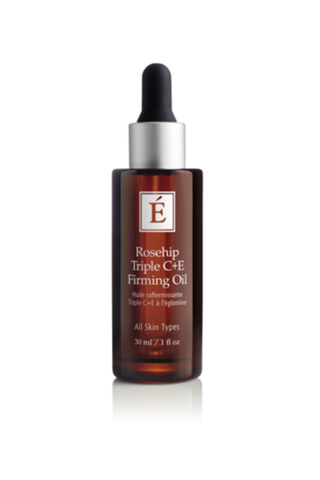
“Okay, yes, this face oil is expensive but it works. My skin is dry and dehydrated to begin with, and the winter weather combined with my apartment’s heater is no help. I also spent two weeks in Los Angeles (a famously dry place) with just this face oil and my regular moisturizer and made it through with flying colors. It instantly makes my skin feel plumper, soft, and soothed. I chalk it up to the inclusion of Vitamin E, which helps heal skin and protect it from free radicals. Rosehip oil also is great soothing redness in the skin as well as making it more resilient. I even apply it under makeup on the coldest, driest days and it adds a lovely glow. I can’t get enough.” — Julia Marzovilla, E-Commerce Editor
Pros: Great for dry skin; Plumping; Environmental protection
Cons: Smells herbaceous
Customer Review: "This product has such a nice consistency, although it's an oil it leaves a beautiful sheen on my face and makes my skin have a very healthy glow rather than leaving it all greasy. I was a bit apprehensive at first to add an oil to my routine, even though I haven't been using it for super long, so far it's been a great addition to my skin care routine and layers well with my moisturizer!!" — Dermstore
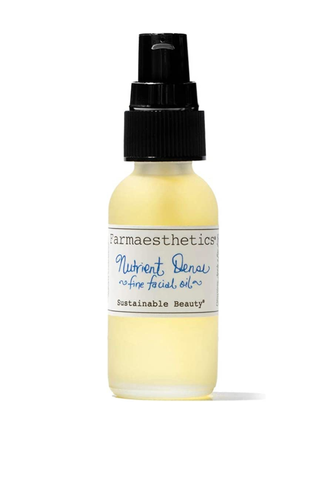
“This little bottle from Farmaesthetics is great for travel. I use one pump as the very last step in my nighttime routine and it’s great at locking in moisture. Plus, the glow is insane. It’s a bit too heavy for me to wear under makeup or in the daytime, but that hasn’t stopped me from using it religiously. It also smells great and takes a minute to settle into my skin so I don’t wake up feeling dry. With that being said, I haven’t noticed any residue left behind.” — Julia Marzovilla, E-Commerce Editor
Pros: Glowy; Plays well with makeup
Cons: Slightly tacky
Customer Review: "This oil is incredible! Light, clean and moisturizing!" — Amazon
How to Use Face Oil
As a rule of thumb, face oil is going to be the very, very last step in your nighttime skincare routine. Should you use it in the morning? Typically you'll want to put it on just before sunscreen and makeup, but exercise a bit of caution. "When using an oil during the day, you do need to be careful about how it interferes with your SPF, as oils have the ability to break down or dilute your sun protection," says Dr. Levin. "To be on the safe side, it’s best to use overnight instead."
Can I Use a Face Oil If I Have Oily Skin?
"It used to be widely believed that using oil in your skin-care routine was a no-no for acne or oily-prone skin. We now understand well that not all oils are the same and while some facial oils can clog skin and worsen acne, the right oils can actually re-balance the skin's sebum and water ratio as well as help hydrate and moisturize the skin," says Dr. Levin. You are going to want to opt for lighter, non-comedogenic oils however, such as argan, jojoba, marula, and rosehip oils.
Meet the Expert
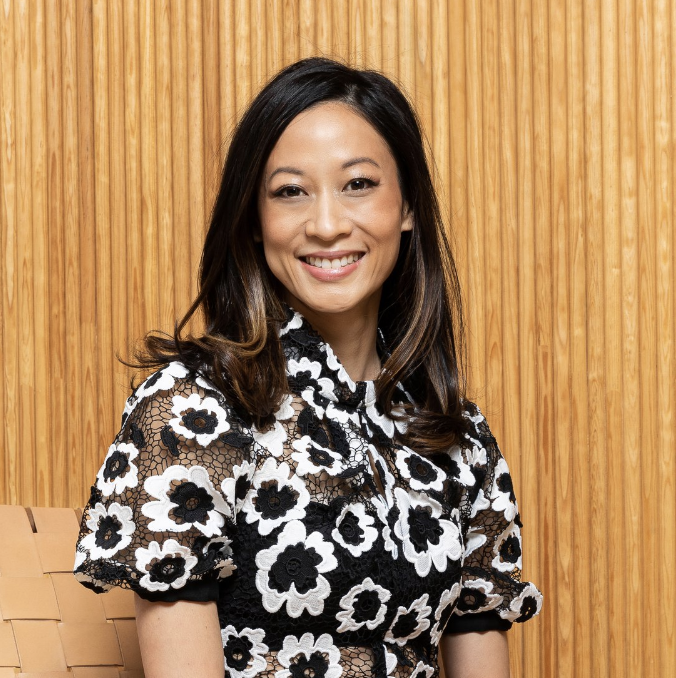
Known for her honesty and love for bespoke medical and cosmetic skin solutions, Dr. Levin has established a loyal following of patients from all walks of life - entire families, skincare enthusiasts, actors, designers, beauty editors, physicians, lawyers, teachers, and many more. As a native Californian, Dr. Levin graduated summa cum laude from the University of California of Los Angeles (UCLA) and earned her medical degree from the University of California of San Francisco (UCSF), as a member of the highest honor society, Alpha Omega Alpha. She completed her internship at the California Pacific Medical Center and dermatology residency at New York University Langone Health. As a clinical assistant professor at Mount Sinai Icahn School of Medicine, she is committed to contributing to the field of dermatology by teaching dermatology resident physicians and medical students, as well as serving as a reviewer for various scientific journals. She is a fellow of the American Academy of Dermatology, the American Society of Dermatologic Society, and the American Society for Laser Medicine and Surgery. She is a leading expert and speaker in facial rejuvenation, laser surgery, acne and rosacea. Dr. Levin has won awards and research grants for her research in laser surgery, acne, and global dermatology. Media knows expertise. Dr. Levin is frequently sought-after as a skincare and beauty expert, regularly contributing to major media outlets and consulting for skincare and beauty companies. Community is a passion for Dr. Levin. She has cared for patients, educated local health care providers, and performed clinical research in various international settings, including Thailand, Uganda, and Botswana. Dr. Levin serves as a member of the Skin Cancer Advisory Committee for Standing Voice, a non-profit organization focused on promoting the well-being of persons with albinism in Tanzania. As a yogi and prior ballerina, Dr. Levin believes in maintaining balance and natural aesthetics. Her commitment to global volunteerism, education, and communication has shaped her holistic approach to skin health. You can often find her in Manhattan, trying different restaurants, local bookstores, watching ballet, and visiting the Met museum with her husband, Ishay.

Samantha Holender is the Beauty Editor at Marie Claire, where she reports on the best new launches, dives into the science behind skincare, and keeps up with the latest trends in the beauty space. She has previously written for Us Weekly, Popsugar, Makeup.com, Skincare.com, and Philadelphia Wedding. Follow her on Instagram @samholender.
-
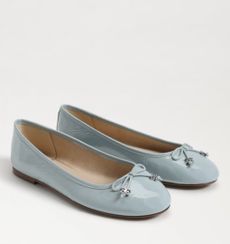 Here’s Everything You’ll Want From Spring Edelman’s Sale
Here’s Everything You’ll Want From Spring Edelman’s SaleFrom sandals to pumps to sneakers, the footwear brand now has over 500 markdowns to shop.
By Lauren Tappan Published
-
 Zendaya Packs Eight Outfit Changes Into 48 Hours
Zendaya Packs Eight Outfit Changes Into 48 HoursAnd they all play with the 'Challengers' tennis theme, of course.
By Julia Gray Published
-
 Tiffany Haddish Says She's Been Diagnosed With Endometriosis and Has Experienced 8 Miscarriages
Tiffany Haddish Says She's Been Diagnosed With Endometriosis and Has Experienced 8 Miscarriages“The devil is real.”
By Danielle Campoamor Published
-
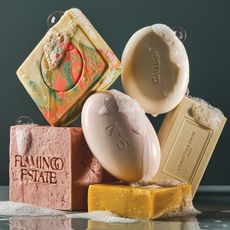 The Bar Soap Boom Is Here
The Bar Soap Boom Is HereDespite endless body wash options, the art of luxury soap making hasn't slipped away.
By Sophia Vilensky Published
-
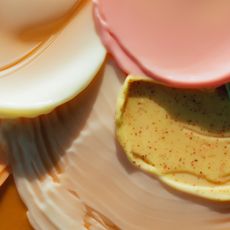 The 13 Best Products for Rosacea That Fight Redness and Irritation
The 13 Best Products for Rosacea That Fight Redness and IrritationFlare-ups are a thing of the past.
By Samantha Holender Published
-
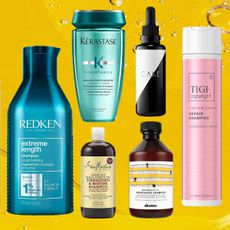 The 32 Best Hair Growth Shampoos of 2024, According to Experts
The 32 Best Hair Growth Shampoos of 2024, According to ExpertsRapunzel hair, coming right up.
By Gabrielle Ulubay Published
-
 The 20 Best Hair Masks for Damaged Hair, According to Experts and Editors
The 20 Best Hair Masks for Damaged Hair, According to Experts and EditorsHealthy strands, here we come!
By Gabrielle Ulubay Last updated
-
 Selena Gomez Just Shared Her Entire Morning Skincare Routine on TikTok
Selena Gomez Just Shared Her Entire Morning Skincare Routine on TikTokThe most giving girlie.
By Iris Goldsztajn Published
-
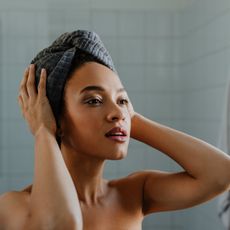 How Often You Should Wash Your Hair, According To Experts
How Often You Should Wash Your Hair, According To ExpertsKeep it fresh, my friends.
By Gabrielle Ulubay Published
-
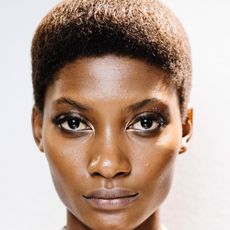 The 11 Best Magnetic Lashes of 2023
The 11 Best Magnetic Lashes of 2023Go ahead and kiss your messy lash glue goodbye.
By Hana Hong Published
-
 Beauty Advent Calendars Make the Perfect Holiday Gift
Beauty Advent Calendars Make the Perfect Holiday GiftThe gift that keeps on giving.
By Julia Marzovilla Last updated